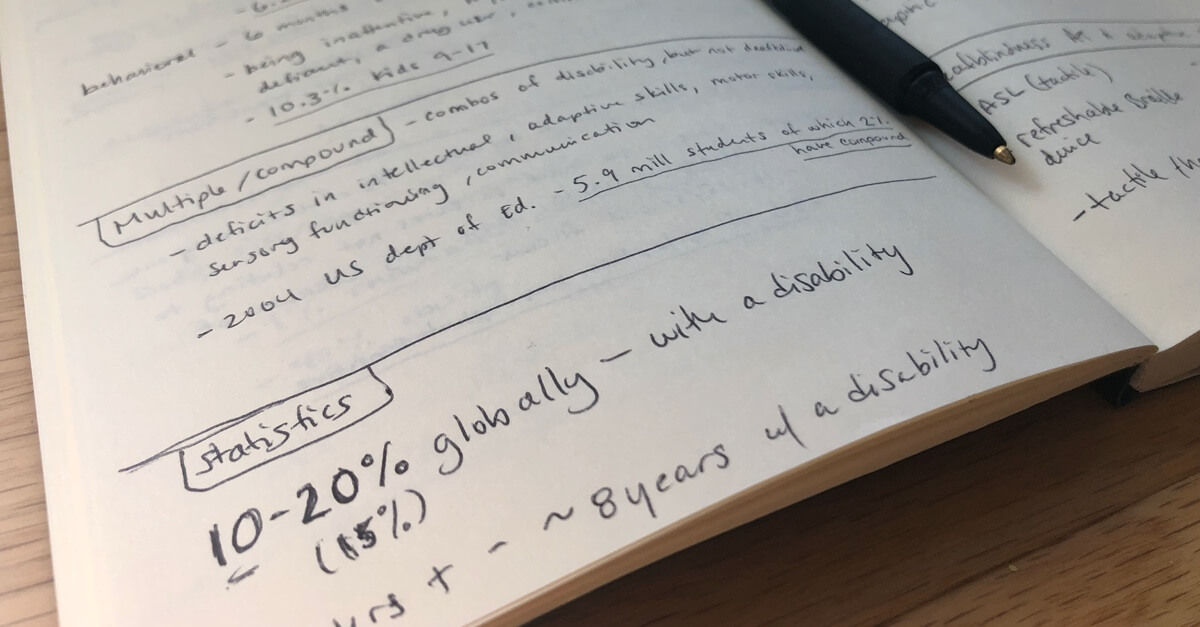Prepping for the CPACC exam
August 27, 2020
TL;DR: Explore a wide range of accessibility-related materials that interest you. Do the Deque University CPACC prep course , read the IAAP CPACC BOK (PDF) , have fun with the resources in each, then go down rabbit holes. 6-8 weeks was how long I spent prepping. The exam is challenging.

I passed the CPACC (Certified Professional in Accessibility Core Competencies) exam that I took in June. Really happy about that!
Since then, a few people have reached out and asked how I approached the prep work. I'll start by first saying that I haven't taken an exam that covered this much material in a long time, so I had anxiety around that. I forgot how to study - how does one study, anyway?
Secondly, I don't think you have to do everything I'm about to explain in order to pass the exam, this was just my personal journey. The key is to make sure you cover a wide variety of topics within the IAAP CPACC outline . One idea is to do the Deque course first and explore using that as your foundation of where else your interest takes you.
I started in January by purchasing the WAS and CPACC prep courses on Deque University, and studied the WAS materials first since I needed to learn it for my day to day work.
In order to really understand the WAS material, I felt my best bet was to play around with actual code. So I took my website off of Squarespace and hard-coded it so I could tinker. I familiarized myself with VoiceOver and how it behaved depending on what I changed in the code.
For no logical reason whatsoever, I decided to take the CPACC exam first, and booked the exam since I only get things done if I've scheduled something that forces me to. The volume of unfamiliar material in the CPACC prep course was immediately daunting. I think I enjoy scaring myself silly.
When the pandemic hit, I had all the excuses in the world to ignore everything and study.
(I did move the exam date back one time by two weeks.)
While the Deque materials are wonderful, do not rely on them alone — they are only one piece of the puzzle. I clicked on the resource links and utilized the free IAAP CPACC Book of Knowledge. I took notes on what I learned, breaking them down and organizing them into the sections of the exam, which is explained well in the BOK. (Writing helps me retain things.) I also went to nearly every resource in the BOK, as well as some of the archived IAAP webinars, which are available to members. (Membership shaves about 25% off your exam fees.)
The biggest and most important thing that helped me (because I was overwhelmed by my perceived lack of structure) was deciding to immerse myself freely, and go down deep rabbit holes on anything that interested me that related to accessibility... to read, watch, and hear different stories so I was getting it in multiple dimensions. I allowed what was truly fascinating to drive my studying. I know I'll remember and integrate it if I'm engrossed in the information. I found podcasts , movies, books, and Ted talks.
Things that helped me study and get lost in:
- Judy Heumann's memoir, Being Heumann: An Unrepentant Memoir of a Disability Rights Activist , the release of which was timely with the recent 30th anniversary of the ADA.
- Crip Camp , which is currently on Netflix and a nice complement to Judy's book.
- The 13 Letters podcast is incredibly interesting and adorable.
- Mel Baggs' videos and articles . Mel was a nonbinary writer who blogged tirelessly about autism, and several other disabilities.
- I found online flash cards for the CPACC that a nice person shared, and used them to test myself.
- I read Haben: The Deafblind Woman Who Conquered Harvard Law by Haben Girma after hearing her interview on 13 Letters.
- The Disability Etiquette Gone Wrong video series by Einsten Health.
- Molly Burke's Youtube channel . Molly is a motivational speaker who was diagnosed with Retinitis Pigmentosa and lost most of her sight by the time she was 14.
The exam itself is hard. The questions are very specific, and they toss in a trick answer in each set of choices. I just went through them one by one, passed on the ones I was stumped on, and kept cycling through them until I was done.
In all of the studying and immersion, I learned about how much bigger the world really is, and also more about who I am inside. I discovered that I present with symptoms of ADHD and OCD, and went down a path to assessment over the summer.
I have a real enthusiasm for all this new insight, and appreciate that I can apply it in my everyday work. It makes what I already love doing that much more awesome and consequential.
If you are planning to take the exam, good luck!
